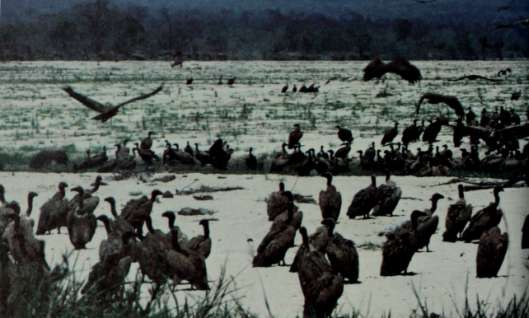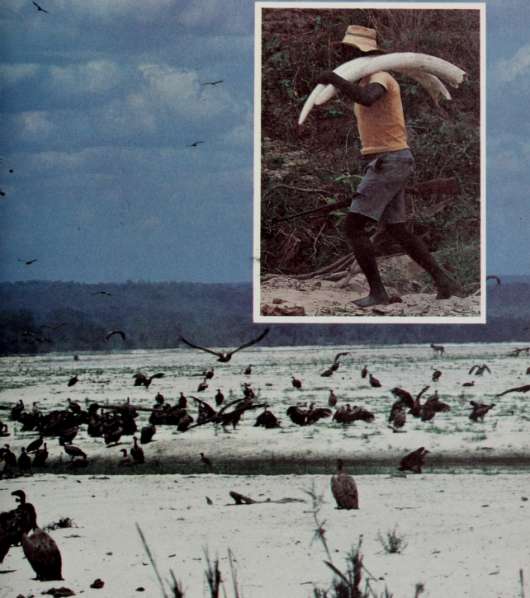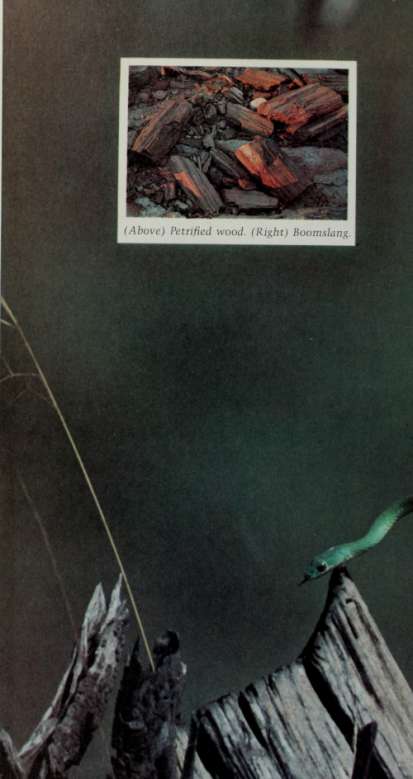Sand rivers (19 page)

\120\
.. V • I

r-O^
■ i7 ' -^ ■
^i^l
1^&^
'^^c^^
::m^
^■"^m
j^^y

/ •
Hi*.
Viy '«^
^
5:t*fflk

Ail'.

kV

y

A

^
fV-J
.••'i -.
/v '^-
yt^
V.<^

y
^*« .*
v; .14.:
fit ;'«.•••
■tJT'

*.. -^W^'lJ^

• »^*. V,-
'#r:^* '■^"''^ .jiu'^
•V \ >\
IX
On an early African morning, Brian and I set off for the south, wading across the Mbarangandu not far above its confluence with the Luwegu. Climbing the ridges between rivers, we shall follow the game trails for about eight miles, then descend to the Luwegu and continue south for perhaps three days before turning east to explore a high plateau with its own extensive swamp or pan. From the plateau, we shall descend a tributary river that comes down off the west escarpment of the plateau and turns northeast, arriving eventually at the Mbarangandu. There is no good map of this region, and neither the plateau nor the river has a name; as for the pan, Brian Nicholson is the only white man who has ever seen it. Excepting lonides and Alan Rees, the warden of the western Selous, he is the only white who has ever walked through the vast southern reaches of the Reserve. "This is the heart of the Selous," Brian told me, "and you and I will be the first into most of the country that we're going to cross." If the water has subsided enough in the next fortnight to permit Land Rovers to come upriver, bringing supplies, we shall explore still further south, up the Mbarangandu; otherwise we shall head back downriver, returning to Mkangira in about ten days.
All but the Nicholson family, still asleep at camp, and David Paterson, who is sick with fever, have come to see us off, and Maria and Hugo wade across the river with us under the armed escort of Bakiri Mnungu. When Hugo tells our porters not to notice his camera, there is an outburst of laughter over the fact that Africans, too, are to be
PETER MATTHIESSEN
photographed, and one porter's sweet squeal is so infectious that in a moment all of us are hooting senselessly, to let off the nervous energy of the departure. Bakiri Mnungu makes the young Ngindo laugh harder and harder, watching the white man as he does so, and Renatus takes such delight in this convivial moment that he is literally falling about on the white sand. Even Nicholson is grinning. Then he says gruffly, "Maya tayari, basi twende!" "Let's go!" Looking worried now, Renatus calls goodbye to his friend Abdallah, the young porter with the infectious laugh, and Abdallah calls back, "Mungu aki penda, tuta onana!" "If God pleases, I shall see you again!"
At this place the river is edged by high elephant grass where big animals might be hidden, and as we pass into it and our friends disappear, the laughing young porters fall silent in an instant, as if entering the unknown. For the next hour, as the sun rises and the file of men climbs to the open woodland of the ridge, there is no sound but the tentative duets of barbets and boubous, and the soft whisper of our passage through dry grass.
In crossing the Mbarangandu, leaving behind the tracks and Land Rovers, the tin-roofed game post, the green tents of our camp at Mkangira, we have also left behind all roads, all sign of man, and in doing so, we seem to have entered a new Africa, or rather, "the Old Africa", as Brian calls it: behind the heat and the still trees resounds the ringing that I hear when I am watched by something that 1 cannot see. "You're getting the feel of it now," he mutters, peering about him, for he, too, has sensed the power and the waiting in the air. "Only people to come this way in years, I reckon; I don't think the bloody poachers have got this far." Years ago, he had laid out a track for patrolling this part of the Mbarangandu, but all that was left was the pathway made by the round wrinkled pads of elephants, in the silent years without sound or smell of man when the huge gray apparitions had followed the abandoned road. The shadow of the road is only visible to the eyes of Goa, and soon it vanishes in the sun and dust.
As tracker and gunbearer, Goa is in the lead, a rifle over his small shoulder with the butt extended toward Brian Nicholson. The gun is a heavy-bore .458 of Belgian make, an "elephant gun", very useful for stopping large charging animals. Goa holds his free hand far out in front of him, as if extending it to be kissed, fingers pointed down as if to dowse the ground before him for the slightest sign or sound or scent of danger; he moves so lightly that he seems to rise ever so slightly off the ground, at the same time craning his head as if to see over tall grasses that, much of the time, are well above his head.